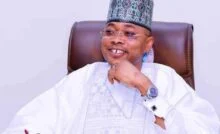Organisers of the ‘End Hunger’ protest in Lagos have announced plans to resume their demonstration at Gani Fawehinmi Freedom Park, Ojota, on Monday, despite recent comments from President Bola Tinubu.
In a statement issued on Sunday, signed by Hassan Taiwo, Ayoyinka Oni, and Adegboyega Adeniji on behalf of the #EndBadGovernanceInNigeria Organising Committee, the group expressed disappointment that it took President Tinubu three days of protests to address the nation.
The statement followed the President’s broadcast earlier in the day, where Tinubu acknowledged the protesters’ concerns and urged them to suspend their demonstrations in favor of dialogue.
“We consider the President’s decision to address the nation an important victory for our movement,” the organizers said.
“Without our courage and resolve to dare the odds, even this acknowledgement would not have happened. So far, we have demonstrated that a President is not greater than the rest of the country,” the statement read.
The group criticised the President for what they described as a dual approach: offering dialogue while also demanding an end to the protests.
They also condemned recent violence against protesters, including attacks by thugs during a Sunday morning worship session and an incident where a protester was struck on live television.
“In our view, the president cannot be approbating and reprobating at the same time. The President cannot offer an olive branch while at the same time holding a dagger to our throat,” the trio said.
The organizers then called on Nigerian youth and the general public to join them at 7 a.m. on Monday at Gani Fawehinmi Park for the fifth day of protests.
They urged the Nigeria Labour Congress, the Trade Union Congress, the media, and the Nigerian Bar Association to support their cause and not “stand idly by” as they face suppression.
The Lagos State government had previously described the protests as peaceful, but recent footage has shown clashes between protesters and hoodlums.
The organizers insist that their demonstration reflects the deep-seated frustration of ordinary Nigerians and remains committed to their demands for governance reform.





























